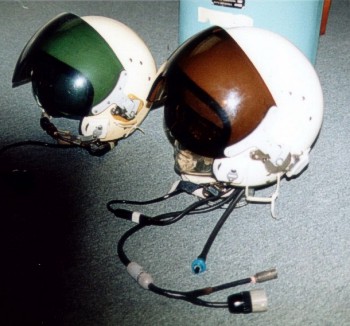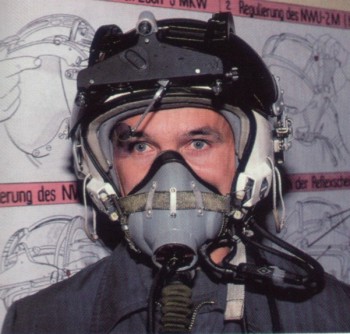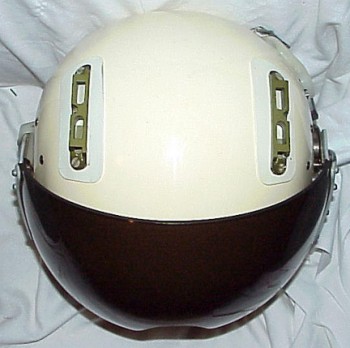The ZSh-5
helmet was standard Soviet issue for its pilots in the 1970's.
These helmets could be found throughout the entire eastern bloc
and huge numbers have been manufactured until the late eighties.
The Helmet
This is a one-piece Fiberglas helmet with interior blue padding
and earphones with speakers. The helmet has an combat edge type
air bag, consisting of a rubber bladder protected by a nylon
bag, used to tighten the face against the KM-34. This happening
automatically as the oxygen pressure is increased. The crash
helmet is designed for protection of the pilot's head against
possible impacts in aircraft cockpits and aerodynamic loads at
ejection. The helmet prevents pilot blindness by sun and
floodlight rays. It also gives the pilot the conditions to
operate during flight by means of the oxygen mask and onboard
equipment. Two-way communications through throat, boom or mask
microphone can be used. The sun visor can be moved in manual
mode to three separate positions or it can be set to automatic
mode where it snaps all the way down with the touch of a button
(or the activation of the ejection seat - nice safety feature!).

ZSh-5 with helicopter boom
microphone (green visor)
and ZSh-5A (brown visor)
The
visor comes in three colours and can be protected when not in
use by a soft cover. The early version of the ZSh-5 has a blue
visor. These visors are only on the oldest series of the
helmets. As they were not a good deterrent against the sun, the
charcoal visor soon replaced both this one and the green visor.
The entire helmet is delivered of factory in a wooden box. The
colour of the box indicates the end user. Known are blue for
Eastern Germany (or indicating export?) and green for the Soviet
Armed forces.

ZSh-5MKV with NWU-2M
The
ZSh-5 helmet has integral headphones and Velcro-attached
padding. This makes the size of the helmet very important. These
come in sizes 1, 2, and 3. Adjustments to fit the helmet are
made by using the chinstrap and tightening the mask to the face.
When looking at the inside of the helmet, beyond the material
and the foam padding, it can be seen that Styrofoam is used. The
ZSh-5 can use the KM-34 and KM-35 oxygen masks (they clip
directly into brackets on the helmet edges). It is of factory
delivered with the KM-34 or KM-34D mask.
Versions
The very early type ZSh-5 is extremely rare these days; it comes
with a blue visor and lacks all of the modifications the later
types have. The ZSh-5 of later age has no automatic mode to the
visor and some lack the air bag in the back of the helmet. Some
of these can be found with a boom microphone for use in
helicopters (Mi-8/Mi-6) and cargo planes. One of the more common
types is the ZSh-5A and this version feature both bladder and
automatic visor release. The following up type was the ZSh-5M
(Modified) and ZSh-5MKV, both having updated components. The
ZSh-5MKV and MKV2 have mounts for the Sh-ZUM-1/NWU-2M Target
Designator system, which are found on the MiG-29.

ZSh-5MKV2 with brackets visible
The
joint stock Company currently supplying these helmets (Telploobmennik
from Nizhny Novgorod) gives the following technical data on the
ZSh-5A in its brochure:
Altitude depends on model of aircraft.
Ambient temperature range, Celsius -50 to +50
Mass of helmet, kg, max 1.95
Mass of mask, kg, max 0,65
Thanks to Craig Martelle
and Motorbuch Verlag for the image of the ZSh-5MKV |